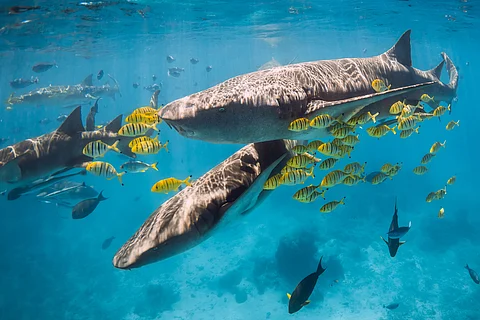

Rising global temperatures could have devastating consequences for marine ecosystems, particularly in tropical and subtropical regions, a UNESCO report has warned. Researchers predict that up to all fish species in these areas may surpass their thermal tolerance limits under the most severe climate change scenario.
This scenario, known as SSP 8.5 or the ‘business as usual’ pathway, projects a global temperature rise of 4.4°C by the end of the century if greenhouse gas emissions continue to increase at the present rate unchecked.
The findings are part of Engaging Communities to Safeguard Ocean Life report, which underscores the vulnerability of marine species as oceans warm, pushing them beyond their known thermal ranges.
Given the current scenario, many species will experience temperatures exceeding their tolerance limits, the report said. It could potentially endanger 10 per cent to 50 per cent of fish species in temperate oceans, which could exceed their thermal thresholds. For example, species in the Tubbataha Reefs and Belize Barrier Reef are already nearing or exceeding their upper thermal limits.
In June this year, UNESCO’s State of the Ocean report revealed that ocean temperatures are now rising at twice the rate observed 20 years ago, with 2023 recording one of the sharpest increases since the 1950s.
Even species with some capacity to adapt are likely to experience increased stress, affecting their survival and reproductive success, the report said.
The findings were presented alongside UNESCO’s marine biodiversity mapping initiative, which used environmental DNA (eDNA) sampling to identify nearly 4,500 species across 21 World Heritage sites.
The mapping was done over a period of three years considering that climate disruption and ocean warming are shifting marine species into cooler and deeper waters from their natural habitats, said Fanny Douvere, head of world heritage marine programme, addressing a press conference.
Only eight per cent of the oceans are protected, Douvere said, emphasising the urgency of protecting the remaining 20 per cent of oceans not yet under protection under the 30x30 initiative. She also called for better understanding and monitoring of species distribution to build resilience, adding that the data would help to protect the marine species being forced away from their natural habitats.
UNESCO has developed a standardised, non-invasive eDNA sampling method to create an inventory of marine biodiversity at 21 of its 51 World Heritage marine sites. These sites are home to over a third of the world’s vulnerable and endangered marine species and harbour 20 per cent of the planet’s blue carbon, including 15 per cent of the global coral reef area.
While eDNA technology has been used before, this marks the first time it has been standardised for monitoring marine biodiversity, Douvere explained. Volunteers collected 1.5-litre water samples to trace genetic information from an average of 100 marine species per sample.
Marine organisms leave traces of DNA in their environment through skin cells, excrement and saliva. By filtering the water samples, researchers were able to extract genetic information about marine species.
As many as 250 volunteers from 19 countries identified 4,406 species, including 2,078 fish species, 86 shark species, 28 mammals and three turtles. Of these, 120 were classified as vulnerable, endangered, or critically endangered on the International Union for Conservation of Nature Red List.
The Ningaloo Coast in Australia yielded the highest number of species identified, with 787 species recorded, including 340 fish and 24 threatened species.
The report also highlighted the detection of rare species, such as the white-spotted guitarfish (Rhynchobatus australiae) in Australia’s Ningaloo and Shark Bay and the giant guitarfish (Rhynchobatus djiddensis) in South Africa’s iSimangaliso Wetland Park.Commerson’s dolphin (Cephalorhynchus commersonii) was found in France’s French Austral Lands and Seas World Heritage site.
In addition to biodiversity, the eDNA method also provided early warnings of invasive species. For example, the presence of invasive lionfish at the Belize Barrier Reef Reserve System was confirmed, enabling local management teams to take preventive action before irreversible damage to the local ecosystems.
“As an example, UNESCO eDNA Expeditions sampling in Belize successfully confirmed the presence of invasive lionfish at the Belize Barrier Reef Reserve System World Heritage site. Although lionfish are already well established in the Caribbean Sea, this documented sensitivity of eDNA monitoring makes it a promising tool for tracking their spread. Indeed, this potential was recognised by local management at the Brazilian Atlantic Islands: Fernando de Noronha and Atol das Rocas World Heritage site,” the report noted.
However, the method has limitations, including biases and variations across taxonomic groups. The report noted failures in detecting species of Requiem sharks of the family Carcharhinidae, such as the oceanic whitetip shark (Carcharhinus longimanus), the Pondicherry shark (Carcharhinus hemiodon) and the Ganges shark (Glyphis gangeticus).
Success in identifying species depended heavily on water quality as well. Tropical sites with clearer waters generally yielded more species than non-tropical locations.
“Turbid waters posed additional issues, resulting in the need to repeat the sampling at some locations, such as the Wadden Sea World Heritage site (Denmark, Germany, Kingdom of the Netherlands),” the findings observed.
The report concluded that it remains unclear how well marine species can adapt to warming oceans. “As ocean temperatures rise, species that cannot adapt or migrate face the risk of extinction, leading to a potential loss of marine biodiversity, or shifts in biodiversity, in affected areas,” it said.